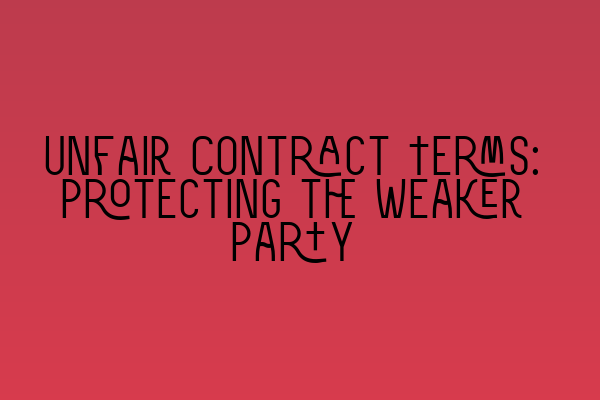Unfair Contract Terms: Protecting the Weaker Party
Welcome to another informative blog post brought to you by SQE Contract Law. In this post, we will explore the concept of unfair contract terms and discuss the importance of protecting the weaker party in contractual agreements. Unfair contract terms can often lead to a power imbalance between the parties involved, and it is crucial for solicitors and legal professionals to understand the legal framework surrounding this issue.
What are Unfair Contract Terms?
Unfair contract terms refer to provisions or clauses that create an imbalance of rights and obligations between the contracting parties. These terms typically favor the stronger party, who may exploit their dominant position to the detriment of the weaker party. In many cases, the weaker party may have little to no bargaining power, leaving them vulnerable to unfair and unfavorable terms.
There are various types of unfair contract terms, including:
- Exclusion clauses: These clauses aim to exclude or limit liability in the event of breach of contract or negligence. They often seek to absolve the stronger party of any responsibility or minimize their potential liability.
- Unreasonable termination clauses: These clauses give one party the right to terminate the contract without valid or justifiable reasons. They may place the weaker party in a precarious position, as they may have invested significant resources or entered into long-term commitments based on the contract.
- Unequal bargaining power: Some contracts may involve parties with significantly different bargaining power. This power imbalance can result in terms that heavily favor the stronger party, leaving the weaker party with limited options or recourse.
Why Protecting the Weaker Party is Important
Protecting the weaker party in a contractual agreement is crucial for several reasons:
- Equitable distribution of risks and benefits: Fair and balanced contractual terms ensure that both parties bear an appropriate level of risk and enjoy the benefits derived from the agreement. By protecting the weaker party, we can prevent unjust enrichment and promote fairness in contractual relationships.
- Preserving contractual intent: When a weaker party enters into a contract, they often do so with a particular intent or purpose in mind. Unfair contract terms may frustrate this intent and undermine the purpose of the agreement. Protecting the weaker party helps ensure that their original intentions are upheld.
- Encouraging access to justice: A power imbalance between the parties may deter the weaker party from seeking redress through legal channels due to the perceived complexity or cost involved. By protecting the weaker party, we facilitate access to justice and promote confidence in the legal system.
Legal Framework for Unfair Contract Terms
The legal framework for unfair contract terms varies across jurisdictions. In the United Kingdom, the Consumer Rights Act 2015 provides extensive protection to consumers against unfair contract terms. The Act states that a contract term will be considered unfair if it causes a significant imbalance in the parties’ rights and obligations to the detriment of the consumer.
Solicitors and legal professionals have a crucial role in identifying and challenging unfair contract terms. By conducting a thorough review of contractual agreements, solicitors can identify any terms that may be considered unfair and provide appropriate legal advice to their clients.
If you’re interested in learning more about related legal topics, check out our articles:
- LLC Formation Made Simple: Step-by-Step Guide for UK Entrepreneurs
- Delaware Corporate Law for UK Solicitors: Key Insights and Practices
- Complying with Legal Obligations: Delaware LLCs in the UK
- The SQE for International Lawyers: A Bridge to British Legal Practice
- Expert Insights: Solicitors in UK Courts – Tips and Strategies for Success
At SQE Contract Law, we are dedicated to providing comprehensive legal guidance and support. If you require assistance with unfair contract terms or any other legal matter, do not hesitate to contact us.
